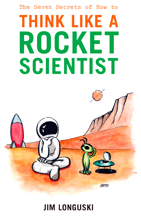 “It’s not rocket science.â€
“It’s not rocket science.â€
The old saying is supposed to put one at ease when attempting to solve a problem. But it also is our way of elevating rocket scientists as the epitome of intelligence. Thus we are left with the image that only the most intelligent people can be scientists and engineers. Please note that I said “most†intelligent because obviously you need to be intelligent to do science.
That said, people have often pointed to the fact that there are more male geniuses or, more recently, that boys make up a large majority of those in the 99% percentile in math:
At the very highest level, the 99.9th percentile, this difference meant 2.15 males for every female. This difference was large enough that, in an occupation requiring math skills at that level, the job ranks could be expected to be filled 68 percent by men, 32 percent by women — enough to explain, as Summers suggested, part of the gender gap.
While I have not seen the breakdown of what people, men and women, who score in the 99th percentile do with their lives, I doubt we can focus on this slim slice of the population to increase the number of scientists and engineers in the United States. Thus the idea that because we currently have more male geniuses is a reason to just accept that we will always have more male engineers is hogwash. Thankfully others see through this flawed logic.
In my career as a student, scientist and advisor, I have seen students who blow my mind with their genius trip on their laurels and ego to fall flat on their face. I have seen students who started their college careers in remedial math, yet worked hard and succeeded not only in passing Calculus, but continued on to graduate school. And yes, I have seen the stereotypes: Genius students sprint through college in 3 years and straight into medical school; others drop out after getting clobbered by Calculus. Having a solid foundation in math is obviously key, but in the end percentiles cannot predict creativity or aptitude for science and engineering.
In my opinion, this argument is merely another excuse to avoid the harder questions of discrimination, curriculum, and the lack of encouragement we give our girls to consider engineering and science. Given the need for more engineers in our society, we should be working to find ways to encourage as many students as possible, of both sexes, to turn to this field. It is a sad fact that even with a 3:1 advantage in math genius, our boys are not turning to engineering as a career and that spells trouble for the future of our economy.

 Last week I sat down with a group of journalism students and they asked what we can do to make math cool for girls. “We simply need to make math cool in general, not just for girls,†I replied. The same goes for science. Science is portrayed as the only field that uses big words (it’s not like law is any better—have you ever tried to read the terms & conditions for Facebook?) and thus intimidates many to think one needs to be a rocket scientist to be well, a scientist. So when scientific studies are printed in the media that “prove†that
Last week I sat down with a group of journalism students and they asked what we can do to make math cool for girls. “We simply need to make math cool in general, not just for girls,†I replied. The same goes for science. Science is portrayed as the only field that uses big words (it’s not like law is any better—have you ever tried to read the terms & conditions for Facebook?) and thus intimidates many to think one needs to be a rocket scientist to be well, a scientist. So when scientific studies are printed in the media that “prove†that 